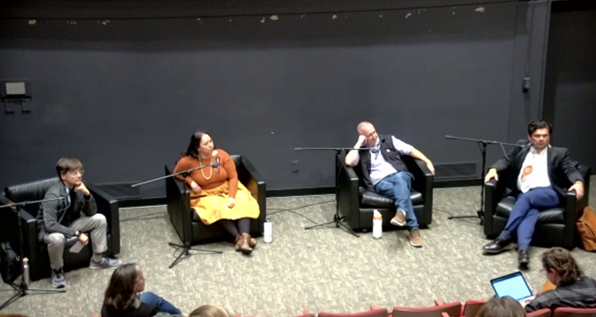Hampshire College hosted a panel discussion titled “Decolonize & Decarbonize” on Oct. 25 to highlight a series of presentations about climate change and its effects on Indigenous communities.
Beginning with a land acknowledgment, writer and researcher Andrew S. Yang moderated the talk among a group of indigenous leaders and climate change activists, featuring Jean-Luc Pierite, Eric Toensmeier and Rowen White.
White is a farmer and seed keeper from the Mohawk community of Akwesasne and is the creative director of Sierra Seeds. She said during her presentation that her area of work is on the behalf of her ancestors, and that she is actively engaged in indigenous sovereignty.
White, who is also the founder of the Indigenous Seed Keeper Network, said that a large amount of her community work goes towards a “safer, helpful, equitable and sustainable food world.”
She called her ancestors her “roots,” and urged people to “recognize our kinship with seeds and food we take care of.”
Her presentation also highlighted the cultivation of seeds throughout history that connect her with her ancestry. Discussing her ancestors, White shared the story of her original ancestor who “came here singing the original songs and planting those original wild seeds died during childbirth.”
White tied this story to her argument for land and Indigenous culture preservation, to “preserve biodiversity that will help us navigate the incoming climate change.”
White urged the Hampshire College community and audience to work with tribal and tribal-based communities. She wants to cultivate “politics of tenderness” and an “economy of care.”
“Each and every one of us has a responsibility to do this culture work,” White added.
“It is not a metaphor that we are related to our seeds,” White explained. She shared how corn, beans, squash, wild plants and medicinal plants are all connections to ancestral roots.
Toensmeier is the author of “Paradise Lot and Perennial Vegetables,” and co-author of “Edible Forest Gardens,” and spoke after White, explaining that how “climate change itself also causes colonization.”
Toensmeier, an English and Spanish lecturer at Yale, discussed the efforts of Indigenous peoples to reclaim their land — that is, “not only being cut down, but is actively drawing more carbon.”
He described the efforts of bioenergy carbon capture, where people burn woodlands and capture the smoke or bury it. Toensmeier explained that this is “not necessarily a problem but it takes a huge amount of land.”
According to Toensmeier, communities in the Tropics have done the most to fight climate change per acre. These communities are the “least to cause climate change but most to fight it,” said Toensmeier.
Pierite is an indigenous leader, activist and designer, and explained his efforts in the community. He showed a photo of the day Boston officially recognized Indigenous People’s Day in lieu of Columbus Day. He emphasized that “what we do on a local level goes out and resonates with people out in the world.”
Pierite, who is also a visiting scholar at Massachusetts Institute of Technology, commented that through his work with students, “we want to shift the narrative about traditional ecological knowledge.”
His speech connected to White’s when he urged people to see themselves as “people of the land.”
Pierite described his involvement in marching after the murder of George Floyd in 2020 and said that the march represented uplifting his community and rooting for the cultures of Black and Indigenous groups.
Pierite is also collaborating with higher education institutions to spread the message that these institutions are on native land. At Hampshire College, Pierite and a group of students created a “living land acknowledgement” out of a woven ribbon hoop where students could write their own connections to the land.
Yang then opened up the discussion to his own questions, as well as questions from the audience.
In one answer, White discussed the importance of young people working alongside their elders, where 16 and 18-year-old children help “infuse” her work with the idea that people’s work “can outlive them” for future generations.
White urged to get rid of “adult supremacy,” to pass tradition.
Pierte explained that schools are “not compatible with the Indigenous knowledge passed along at home.”
“We have to continue to fight,” Pierite said.
Abby Joyce can be reached at [email protected].




















